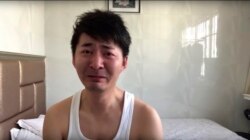For almost two weeks, 34-year-old Chen Qiushi filmed in and around Wuhan, the Chinese city at the center of the coronavirus outbreak.
Chen took videos of people who had died from the virus, now called COVID-19. His camera also recorded images of those sickened and awaiting treatment at busy hospitals.
With each online post, Chen looked increasingly tired. He was no longer the energetic young man who went to Wuhan to tell its citizens’ stories.
Then last week, the Chinese lawyer-turned-activist disappeared.
Chen Qiushi was one of the best-known pioneers in a small movement that is fighting the ruling Communist Party’s control on information.
With smartphones and social media, these citizen-journalists are telling their stories and the stories of others in Wuhan and nearby communities.
This unofficial form of storytelling has never happened before in any other major disease outbreak or disaster in China. And, it is presenting a major test for the Communist Party. The party has controlled the country’s news and information since taking power in 1949.
“It’s very different from anything we have witnessed,” said Maria Repnikova, who studies Chinese media. She is a communications professor at Georgia State University in the United States.
Never have so many Chinese, including victims and health care workers, used their phones to televise their experiences of a disaster, she said. That is partly because the more than 50 million people locked down in cities are “really anxious and bored and their lives have pretty much stopped,” Repnikova said.
State media praise the Communist Party’s efforts to build new hospitals and increase production of face masks to guard against infection. Yet media reports have yet to provide details on the conditions that are driving these efforts.
But Chen Quishi did. He showed the sick filling hospital hallways and the struggles of locals to get treatment.
In one video taken outside a train station, Chen said, “Why am I here? I have stated that it’s my duty to be a citizen-journalist. What sort of journalist are you if you don’t dare rush to the front line of a disaster?”
A video published on January 25 showed what Chen said was a body left under a cloth outside an emergency room. Inside another hospital, he filmed video of a dead man still sitting in a wheelchair, his head hanging down and his face colorless.
“What’s wrong with him?” he asked a woman who was holding the man up.
“He has already passed,” she answered.
Chen’s posts and vlogs, or video blogs, have been played millions of times. They have also received attention from Chinese police.
In one video posted near the end of his first week in Wuhan, Chen said police had called him, wanting to know where he was, and questioned his parents.
“I am scared,” he said. “I have the virus in front of me, and on my back, I have the legal and administrative power of China.”
His voice shook with emotion and tears formed in his eyes. He promised to continue what he was doing “as long as I am alive in this city.”
“Even death doesn’t scare me!” he said. “So you think I’m scared of the Communist Party?”
Last week, Chen stopped posting videos. His mother broke the silence with her own video post last Friday. She said he was unreachable and appealed for help in finding him.
Later that day, his friend and well-known mixed martial artist Xu Xiaodong said in a live YouTube broadcast that Chen had been forcibly quarantined for 14 days. He said Chen had been healthy and showed no signs of infection.
‘Don’t believe rumors, don’t spread rumors’
The death of a Wuhan doctor last week increased attention on earlier efforts to suppress free speech. Police had accused Dr. Li Wenliang of spreading false information after he voiced concern in December about the outbreak. He later died of the virus.
His death led to extreme sadness -- along with public anger at officials for how he had been treated.
Wuhan police sent an Associated Press request for comment to local officials in Hubei Province. But repeated telephone calls to the Hubei foreign affairs office went unanswered. Instead, a recorded message said: “Don’t believe rumors, don’t spread rumors.”
Migrant worker Gao Fei was detained after criticizing Chinese President Xi Jinping over the coronavirus outbreak. Gao said that the doctor’s death and Chen’s disappearance should be “a wake-up call for the Chinese people.”
“The number one reason our government couldn’t control this is because they always conceal the truth and block information from citizens,” he said.
Gao praised Chen’s bravery and push for social progress. “He’s… the backbone of China,” he said.
I’m Ashley Thompson.
And I'm John Russell.
The Associated Press reported this story. Ashley Thompson adapted it for VOA Learning English. George Grow was the editor.
_______________________________________________________________
Words in This Story
outbreak - n. a sudden start or increase of fighting or disease
post - n. a piece of wood or metal that is set in an upright position into or on the ground especially as a support or marker
pioneer - n. a person who helps create or develop new ideas, methods, etc. — often + in
lock down - phrasal verb. to prevent people from entering or leaving an area
anxious - adj. afraid or nervous especially about what may happen
scared - adj. afraid of something
quarantine - n. to keep (a person or animal) away from others to prevent a disease from spreading
rumor - n. information or a story that is passed from person to person but has not been proven to be true
conceal - v. to keep (something) secret






